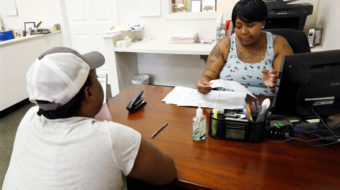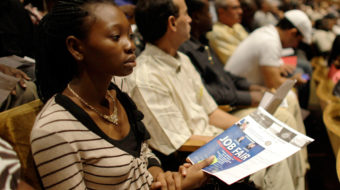LONDON (PAI) – Conservatives in the United States and Great Britain have been marching, in lockstep, for over three decades, pushing a variety of almost identical comfort-the-comfortable policies that made their nations two of the most unequal in the world. But the marchers may now be headed in somewhat different directions.
In the UK, the Conservative Party gained a parliamentary majority through a coalition with the third-place Liberal Democrats, but only after agreeing, as one analyst notes, “to ditch a few of their ugliest policies – like giant inheritance tax cuts for double-millionaires.” British conservatives are even swallowing “considerably higher taxes” on capital gains, the income the wealthy reap from selling stocks and other assets.
Meanwhile, in the United States, conservatives are busily blasting any move to end GOP President George W. Bush’s tax cuts for America’s richest. The nation, they’re warning, remains weighed down by a horrific tax burden that threatens to beggar us all. There’s just one problem with the GOP’s claim: It’s wrong. Nevertheless, the British may be stepping into a new era, while we still have a way to go.
Taxes on the wealthy in the United States run low. Many wealthy Americans want these taxes to run even lower. But the American people, for some strange reason, have never rallied around candidates who champion tax cuts for the richest among us. So rich people-friendly politicos do the next best thing. They champion tax cuts for all.
But this approach can prove problematic, too. Across-the-board tax cuts for everybody, the rich included, can quickly end up gutting the revenues that fund the public services average Americans depend upon and appreciate.
How do friends of the fortunate sidestep this inconvenient reality? They wildly exaggerate the tax burden that falls on average Americans. They endeavor to convince America’s non-rich majority that we’re deeply and terribly “overtaxed.”
Now, two new data sources challenge this “overtaxed” claim. One compares what U.S. taxpayers pay now to what they used to pay in years gone by. The other compares tax bills in the United States to tax bills elsewhere in the developed world.
The two analyses, in the end, tell the same tale: Any candidate or lawmaker who calls the United States “overtaxed” is running interference for America’s rich. He or she is also flat wrong.
The first new analysis – from the U.S. Commerce Department – shows that total income, property, sales, and various other taxes together equaled 9.2% of all U.S. personal income in 2009, the lowest such rate since 1950.
The second, an analysis from the industrial world’s official economic research agency, found that the average married couple with two kids in the United States has a tax burden one-half the size of the comparable average family in the developed world as a whole.
This second analysis zeroes in on what the Paris-based Organization for Economic Cooperation and Development, or OECD, calls the “tax wedge,” the difference between what an employer has to spend to employ someone – both in wages and the employer’s share of social security taxes – and what that employed person actually nets, after taxes, in take-home pay.
In 2009, for the developed world as a whole, the “tax wedge” – or, more simply put, the tax burden – stood at 26% of employment costs for average-wage couples with two children. In the United States last year, that average family tax burden ran 13.7%.
Only five of the nations the OECD tracks had a lower tax burden than this U.S. rate. Twenty-four had a higher rate.
The bottom line? By any rational historical or global standard, we don’t have an “overtaxation” problem in the United States.
Our problem lies elsewhere. We have an under-taxed rich. Under current U.S. tax law, the wealthy in the United States don’t have to pay much in taxes. Even worse, they don’t even pay what they owe.
Another reminder of this systematic shortchanging of Uncle Sam emerged from the independent panel Congress created in 1998 to monitor the IRS. According to the latest available figures, this IRS Oversight Board notes in its new annual report, $290 billion a year in taxes due is going uncollected.
Not all of that, to be sure, reflects tax evasion by the rich. But tax evasion by the wealthy represents an oversized share of that gap. In 2008, one study broke the IRS “tax gap” data down by income level and found that Americans making between $500,000 and $1 million a year were underreporting their incomes at triple the “misreport” rate of taxpayers making between $30,000 and $50,000.
What’s the IRS doing about all this? The Oversight Board sees some promise in recent IRS action. The agency, notes the board, “initiated a major effort in 2009 to
identify taxpayers who were hiding money in offshore tax jurisdictions.”
As part of that effort, the UBS Swiss banking giant agreed to turn over the names of 4,450 U.S. taxpayers who had been stashing dollars in secret Alpine accounts. And 14,700 U.S. taxpayers agreed to reveal details on their own offshore accounts after the IRS set up a voluntary disclosure program.
Data from these 14,700 affluent taxpayers, says the Oversight Board, will hand the IRS “a wealth of information to mine for future enforcement efforts.”
Unfortunately, on the audit front, the IRS doesn’t seem to be moving with the same sense of urgency. Close examinations of high-income returns remain relatively rare. The exam rate for taxpayers making over $200,000 a year has essentially remained flat for the past three years, hovering around 2.9%.
And the IRS still lacks an up-to-date sense of how much in taxes America’s rich are evading. The $290 billion “tax gap” estimate the IRS Oversight Board cited comes from data collected way back in 2001.
This failure to update the tax evasion stats, notes the Oversight Board, makes it “difficult, if not impossible, for the Oversight Board, the IRS, or any other member of the tax administration community to determine with any degree of certainly that the IRS is making progress in reducing the tax gap.”
We need that progress. In troubled economic times, we need that money.
Veteran labor journalist Sam Pizzigati edits Too Much Online (http://toomuchonline.org), a newsletter about wealth and income sponsored by the Institute for Policy Studies, a Washington research group.










